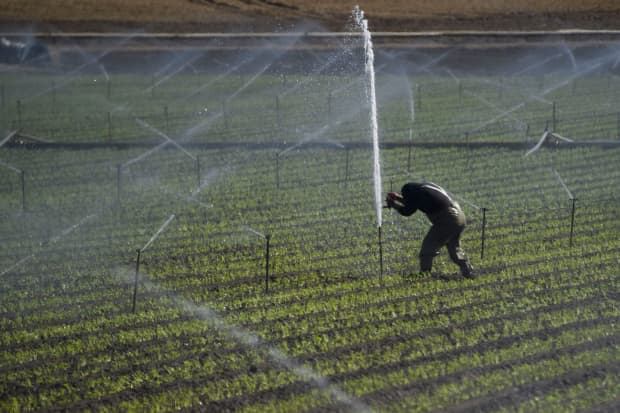The original green sector – agriculture — hasn’t been on the radar for environmental, social and governance investors, given industrial agriculture’s heavy dependence on pesticides, fertilizers and genetically modified seeds.
But ESG investors are turning their interest to agriculture as a way to fight climate change. In November, the US SIF, an organization that follows sustainable investing, said sustainable agriculture was an important investing issue for money managers, the first time this issue cracked the top five specific criteria. Of the $17 trillion invested in ESG issues, money managers said they devoted $2.38 trillion to sustainable agriculture while institutional investors devoted $2.18 trillion to the theme.
It’s a harder investment for individual investors; there are no targeted mutual funds or exchange-traded funds for sustainable agriculture and just a handful of stocks to choose from.
Investing in sustainable agriculture is still in early stages, not unlike where the renewable energy sector was in 2007 as far as ESG investor interest, says Erin Fitzgerald, CEO of USFRA, a national network of farmer and rancher-led organizations that’s working to expand ESG investment in sustainable agricultural technologies. USFRA recently released a report about how ESG investors can think about public or private investments in agriculture to mitigate climate change by improving soils.
That could mean a money-making opportunity for investors, especially if the valuation premiums usually given to ESG companies aren’t priced in. But given that it took renewable energy years to become profitable, there could be stumbles. Plus, some ag companies may be improving their environmental record but also have other aspects that ESG investors find distasteful, such as researching genetically modified organisms or poor worker policies.
Read: If you support green energy, you should buy utilities and oil stocks — here’s why
Promising ag technologies
U.S. agriculture contributed 9.9% of total U.S. greenhouse gases in 2018, according to the Environmental Protection Agency. But scientists say that could shrink, and agriculture could even become a carbon sink — more than offsetting its carbon emissions — with new technology and some changes to production, such as more widespread use of cover crops and compost, reduced tillage and more precise fertilizer management. That excites some ESG proponents. One idea Biden administration is eyeing is creating a carbon bank that would pay those who return carbon to the soil.
Levi Stewart Zurbrugg, a portfolio manager at Saturna Capital, a sustainable asset manager that has agriculture investments, says one reason sustainable agriculture hasn’t see a lot of ESG investing is its complexity.
Sustainable agriculture doesn’t necessarily equal small, organic farming, says Zurbrugg, who has written a report on ways to cut carbon and increase food production. “It’s really a host of different and sometimes even competing practices.”
Notions that farmers are uninterested in sustainability may be hampering outside investors. Farm lender Federal Agricultural Mortgage Corp.
AGM,
“There’s a large myth that farmers are industrially oriented and do not care about the land. I would say that, in practice, the inverse is true. The No. 1 asset that farmers have is their soil,” says Carter Malloy, founder of AcreTrader, a farmland-investing platform for accredited investors.
One promising technology to increase crop yields without using GMOs comes from Danish firm Novozymes
NZYM.B,
When it comes to animal agriculture, cutting enteric fermentation – cow, sheep and goat farts and burps – would be a big win since they contribute significantly to agricultural production emissions, Zurbrugg says. Those farts are a byproduct of ruminant animals not properly digesting their food. Dutch firm Royal DSM
DSM,
Opinion: To get cows to burp and fart less methane gas, just add seaweed to their diet
Cindy Bohlen, research analyst at Riverwater Partners, an ESG investing firm, says the firm recently started investing in Farmer Mac. Some of Farmer Mac’s loans allow farmers to build on-farm renewable energy systems, and it is extending broadband internet services to rural areas.
Farmers — particularly smaller farmers — need high-speed internet to more efficiently analyze their farm data and become more competitive. But now, extensive digital farm-management systems that allow farmers to get extensive data are limited and often only available from companies such as Bayer AG
BAYN,
A related trend called precision agriculture has become more popular in the past several years as farmers use satellite imagery to gather data about their farms or efficiently control inputs.
One way to invest in that trend is through Trimble Navigation
TRMB,
Farmers are also using drone technology to scope out problem areas, and small-cap firm AgEagle Aerial Systems
UAVS,
While not a pure agricultural play, agricultural irrigation is part of water-solutions company Xylem’s
XYL,
Considering the E, the S and the G
Some agribusiness and food companies are making strides to reduce carbon and improve supply changes. Bohlen points to food giant Nestle
NESN,
Chris Huemmer, senior investment strategist at Northern Trust Asset Management, points to Archer Daniels Midland
ADM,
Tyson Foods
TSN,
But while Tyson Foods may be making strides environmentally, the company saw big outbreaks of the coronavirus in its U.S. meatpacking plants last year, and also came under fire after news reports of seven plant managers (later fired) bet whether workers would get sick with COVID-19.
Cases like Tyson Foods make it hard for some ESG investors to commit to sustainable ag. Bohlen says it’s why ESG investors need to look throughout the supply chain to see how companies are solving problems. Nestle, for example, has made its supply chains more sustainable over the past 10 years.
Jeff Finkelman, a senior research analyst at Fiduciary Trust International, says agriculture is changing, and consumer demand for healthier, more sustainable foods can help speed it further.
“The market is going to respond to that consumer pressure,” he says, adding “supply chains that rely on some of these more climate-smart practices, can have a real effect, because they send a very strong price signal to the market that there’s demand for this service.”
Debbie Carlson is a MarketWatch columnist. She doesn’t own any of the stocks mentioned in this article. Follow her on Twitter @DebbieCarlson1.
More from Debbie Carlson
Vanguard is beefing up its ESG staffing – are more sustainable-investing funds on the way?
Your ESG investment may be a ‘light-touch’ fund and not as green as you think
What new Amazon CEO Andy Jassy needs to do to become a leader in sustainability like Apple





